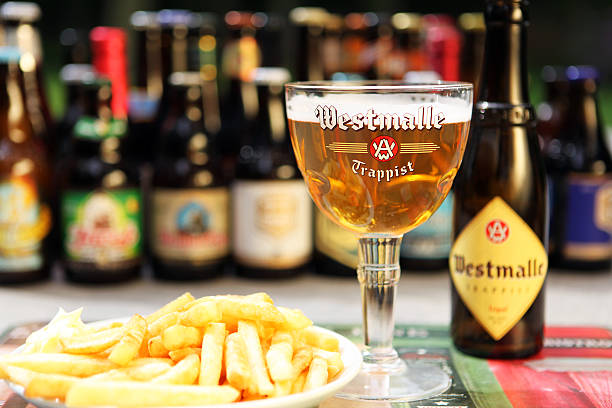This website uses cookies so that we can provide you with the best user experience possible. Cookie information is stored in your browser and performs functions such as recognising you when you return to our website and helping our team to understand which sections of the website you find most interesting and useful.
Could this be the end for Belgium’s Trappist beers?
The future of Trappist beer faces uncertainty due to fewer people in Belgium being drawn to life as a monk.

In an rare interview Brother Benedikt the abbot of Westmalle told The Observer: “It must be admitted that the state of most monastic communities is precarious.”
The ‘Authentic Trappist Product’ label is only given by the International Trappist Association (ITA) to breweries that make their beer inside an abbey, under the supervision of monks or nuns and, in addition, all profits must go towards the religious community, the Trappist order or to charity.
As of 2021, Achel Brewery in Belgium is no longer considered to be of Trappist status since it does not have any living monks working there, despite its beer recipe remaining unchanged.
Despite immediate concerns, back at Westmalle, the secular managing director of the brewery Philippe Van Assche reportedly reassured that even though “nowadays, we don’t have a lot of vocations” people could return to choosing monastic life in the future and added: “To be honest, I think there is a kind of caesura…a kind of break.”
Van Assche hinted that, in his opinion, monasteries with the “most severe” rules “are nowadays the most successful” and hinted that Westmalle was only “a bit strict”.
Brother Benedikt added: “For someone with a true vocation, it is not really difficult [to become a monk] – at least no more difficult, I think, than any other life choice. However, today’s society offers few starting points that can give rise to a monastic vocation. Religious life is no longer considered important and is seen as mysterious, with a negative connotation. Joining a monastic community has become a big step in that respect, but in itself it is a much richer, more meaningful and fascinating form of life than one might suspect.”
Van Assche asked: “If one day another monastery would just cease to exist, what are we going to do with this legacy, with our tradition, with the values we have been living for? How can we still be loyal to the values of what Trappist [monasteries] stand for and preserve this unique way of running a commercial activity for future generations?”
Luc De Raedemaeker, director of the Brussels Beer Challenge revealed that Westmalle, is now only one in five Trappist breweries in Belgium alongside Chimay, Orval, Roquefort and Westvleteren, yet these breweries remain “some of the best in the world”.
De Raedemaeker reiterated how “Trappist beer can be anything. A Trappist brewery can make a pilsner, it can make an IPA or a tripel. It can make a white beer or whatever you want” and highlighted how Westmalle Dubbel still remains one of the finest beers ever made.
Westmalle reportedly has wanted to secure many of the jobs of its staff, including 51 lay people to work in the brewery, but Van Assche is cautious and not convinced that ITA rules can be made flexible enough to accommodate those needs. He explained: “If that happens, then we will just be abbey beers.”
Belgian beer expert Sofie Vanrafelghem added: “I think the Trappist monk communities may be more multicultural and more diverse” and observed how “the most special part is that it’s not brewed for profit” and hinted that people should remember that “the quality is really high” and “if they [the brewery staff] take extra time to make a perfect beer, who cares? They’re not there to make profit. They want to make a true and pure beer”.
Vanrafelghem outlined how it isn’t just down to the ethos, but the quality of ingredients that the Trappist breweries use, plus they don’t compromise or cut any corners. She explained: “The brewers of Westmalle, for instance, use flower hops, rather than industrially produced pellets. So that’s more expensive, but that gives the beautiful bitterness at the end. If you put Belgian beer experts in a cafe and you don’t give them a menu, they will order a Trappist because they are sure of the quality.”
Related news
Stone Brewing to cease all international exports

